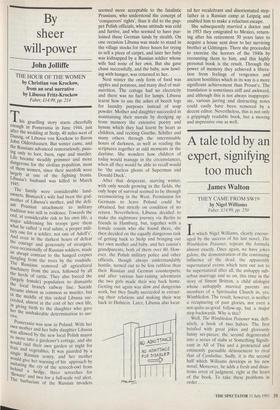By sheer will-power
John Jolliffe
THE HOUR OF THE WOMEN by Christian von Krockow, from an oral narrative by Libussa Fritz-Krockow Faber, £14.99, pp. 214 This gruelling story starts cheerfully enough in Pomerania in June 1944, just after the wedding at Stolp, 40 miles west of Danzig, a Libussa von Krockow to Baron Jobst Oldershausen. But winter came, and the Russians advanced remorselessly, paus- ing only to loot, burn, rape and murder. Life became steadily grimmer and more dangerous for the civilian popultion, most of them women, since their menfolk were largely at one of the fighting fronts. Libussa's husband was killed in March
1945.
The family were considerable land- owners. Bismarck's wife had been the god- mother of Libussa's mother, and the defi- ant Prussian attachment to military tradition was still in evidence. Towards the end, at considerable risk to his own life, a major addressing his troops gave them What he called 'a real salute, a proper mili- tary one for a soldier, not one of Adolf s'. And even in the darkest hours of defeat the courage and generosity of strangers, even occasionally of Russian soldiers, made an abrupt contrast to the hanged corpses dangling from the trees by the roadside. The Russians removed all agricultural machinery from the area, followed by all the herds of cattle. They also forced the (largely female) population to dismantle the local branch railway line. Suicide became almost as common as murder, but in the middle of this ordeal Libussa suc- ceeded, almost at the cost of her own life, in giving birth to the daughter who gave her the unshakeable determination to sur- vive.
Pomerania was now in Poland. With her own mother and her baby daughter Libussa Was allowed by the new local Polish mayor to move into a gardener's cottage, and she Would raid their own garden at night for fruit and vegetables. It was guarded by a single Russian sentry, and her mother would give her warning of his approach by imitating the cry of the screech-owl from behind a hedge, three screeches for
The and two for a full-scale red alert. The barbarism of the Russian invaders seemed more acceptable to the fatalistic Prussians, who understood the concept of 'conquerors' rights', than it did to the pup- pet Polish officials, whose attitude was cold and furtive, and who seemed to have pur- loined these German lands by stealth. On one occasion Libussa was made to stand in the village stocks for three hours for trying to sell a piece of carpet, and later her baby was kidnapped by a Russian soldier whose wife had none of her own. But she gave chase successfully, and the baby, now howl- ing with hunger, was returned to her.
Next winter the only form of food was apples and potatoes, and many died of mal- nutrition. The cottage had no electricity and there was no fuel for lamps. Libussa learnt how to use the ashes of beech logs for laundry purposes instead of soap powder. Mother and daughter succeeded in maintaining their morale by dredging up from memory the extensive poetry and hymns which they had learnt by heart as children, and reciting Goethe, Schiller and many others through the interminable hours of darkness, as well as reading the scriptures together at odd moments in the daytime. She wonders how children of today would manage in the circumstances, when all they would be able to recall would be 'the useless ghosts of Superman and Donald Duck'.
After that desperate, starving winter, with only weeds growing in the fields, the only hope of survival seemed to be through reconnoitring in the West. Permission for Germans to leave Poland could be obtained, but strictly on condition of no return. Nevertheless, Libussa decided to make the nightmare journey via Berlin to friends in Hamburg, but, together with a female cousin who she found there, she then decided on the equally dangerous task of getting back to Stolp and bringing out her own mother and baby, and her cousin's grandparents, both of them over 80. How- ever, the Polish military police and other officials, though always understandably hostile, turned out to be less ruthless than their Russian and German counterparts, and after various hair-raising adventures the two girls made their way back home. Getting out again was slow and dangerous work, but they finally succeeded in extract- ing their relations and making their way back to Holstein. Later, Libussa also locat-
ed her recalcitrant and disorientated step- father in a Russian camp at Leipzig and enabled him to make a reluctant escape.
She subsequently married a doctor and in 1953 they emigrated to Mexico, return- ing after his retirement 30 years later to acquire a house next door to her surviving brother at Gottingen. There she proceeded to exorcise the horrors of the 1940s by recounting them to him, and this highly personal book is the result. Through the power of memory they achieved a libera- tion from feelings of vengeance and ancient hostilities which in its way is a more significant achievement than Proust's. The translation is sometimes stiff and awkward, and although this is not always inappropri- ate, various jarring and distracting notes could easily have been removed by a decent editor. Nevertheless, this is not only a grippingly readable book, but a moving and impressive one as well.


















































 Previous page
Previous page